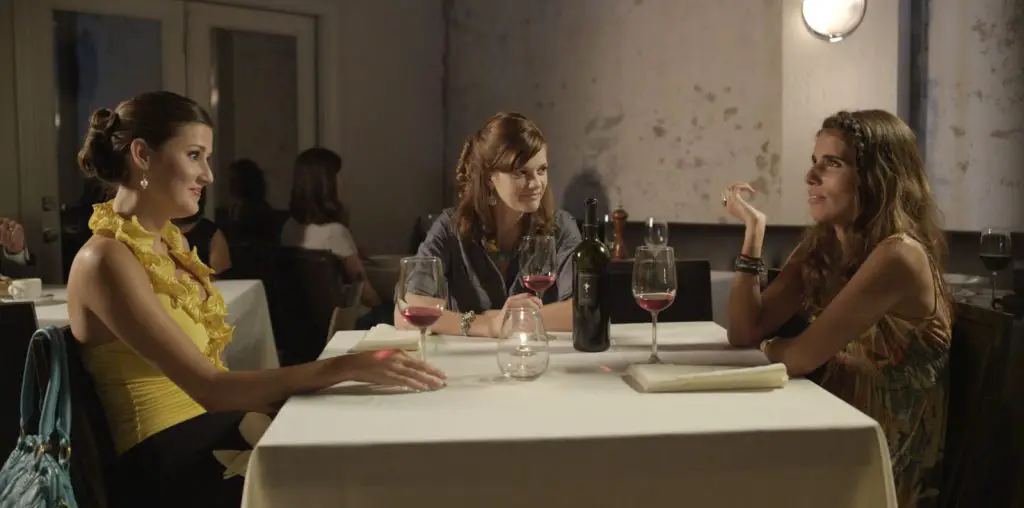
“Radio Flyer” is a coming-of-age story that tries to cross-breed the sentimentality of “E.T.” with the hard edge of “Stand By Me,” with tepid results. Book-ended by an uncredited appearance by Tom Hanks (who also narrates the tale), the film concerns Mike (Hanks as an adult, Elijah Wood as a kid) and Bobby (Joseph Mazzello), two boys who travel to California with their mother after their dad simply disappears.
She meets a new guy who calls himself “The King” (a brighter warning sign I have never seen) and the four settle into a home in the suburbs. All seems fine until The King begins hitting Bobby. On top of that, the boys have no friends and are picked on constantly by some neighborhood kids, a sub-plot that’s never brought to a conclusion. Bobby loves planes, and soon Mike hits on an idea: they will transform their Radio Flyer wagon into a flying contraption that will get Bobby away from The King forever. Local legend says that ten years ago, a kid named Fisher made a legendary jump off a nearby hill and almost flew away. However, we’re told that he was too old to believe in childhood magic, and Bobby is just the right age to let the impossible happen.
The premise is promising, but the film crashes to Earth with the same force as Fisher. I can understand how a mom like theirs (in an admirable performance by Lorraine Bracco) might miss the warning signs of abuse because she so desperately wants to have a family again. And I can understand her taking The King back after he gets out of jail for severely beating Bobby—he says his drinking was the cause, so of course he says he’ll stop, and she believes him, something a lot of women do. But this is a mom who clearly becomes infuriated during the final act when she discovers he hasn’t stopped, so the implication is that she’s tougher and smarter than the women who allow such cycles to play out endlessly. But then why does Bobby have to go away forever? Don’t these kids have any trust at all in their mother? They certainly never express the idea that she’s so horrible that the only solution is for Bobby to believe in special childhood fairy dust and fly away. On top of it, a neighborhood cop shows concern for them and lets them know that they can turn to him if they need help.
Director Richard Donner takes a heavy hand with screenwriter David Mickey Evans’ script, playing up the “magic of childhood” thing to the point that it becomes too much. I’ve never read the script, but if the movie is a verbatim translation of it, then Donner should have figured out how to solve some of its problems before he made the film. For example, at one point the boys become sick at school (the only time we ever see them there, actually) and simply run home, certain that something is wrong with their dog, Shane. How do stomachaches translate into dog trouble? Why doesn’t their teachers call home to find out why they took off? And what does the buffalo that pops up in Mike’s dreams early in the film have to do with anything, other than to serve as an awkward thread to tie together a nice moment early in the story with the ending?
The adult Mike, who’s relating this tale to his two sons, talks about how “history is in the telling” at the beginning of the film and then repeats that phrase during the coda. The idea is that what we’ve just seen is his fanciful interpretation of what really happened, which makes sense since most of us view our childhoods differently than our parents remember them, thanks to childhood fairy dust or talking buffaloes or whatever. Okay, but what really happened to Mike’s brother? I expected one of his kids to say something like “Oh, that’s why Uncle Bobby is a paraplegic/became an airline pilot/lives on the streets” during the second book-end. After all, in the “real world” of the film, they must have grown up with a certain understanding of their Uncle Bobby, an understanding that was obviously incomplete, given what adult Mike says at the beginning of the film about how he left things out when telling them about his childhood.
Instead, we’re offered nothing except this idea that Bobby magically flew around the world, and Mike and his mom were okay with it because they received postcards from him every so often. (Sorry for spoiling the ending, but I can’t imagine I’m really ruining the film for you.) So did Bobby beg on the streets for food during his trip? Do odd jobs to survive? And how did Mike’s kids wind up with the turtle, if Bobby took it with him and his whereabouts as an adult are never accounted for by the story? I don’t mind a movie that gives us a story from a certain character’s point of view; I just don’t want to be left with a ton of unanswered questions at the end. There’s no resolution to Bobby’s story, and he’s the one who suffers the most.
I understand that “Radio Flyer” has a cult following of some kind, although it must not be very big since this DVD was released as a bare bones disc. You get trailers for “Avalon,” “The Karate Kid” and “Riding in Cars with Boys,” but not one for this film. And that’s it. You’d think Columbia TriStar could have at least brought in Donner and/or Evans for a commentary. Maybe they could have cleared up some of the problems with the story.
